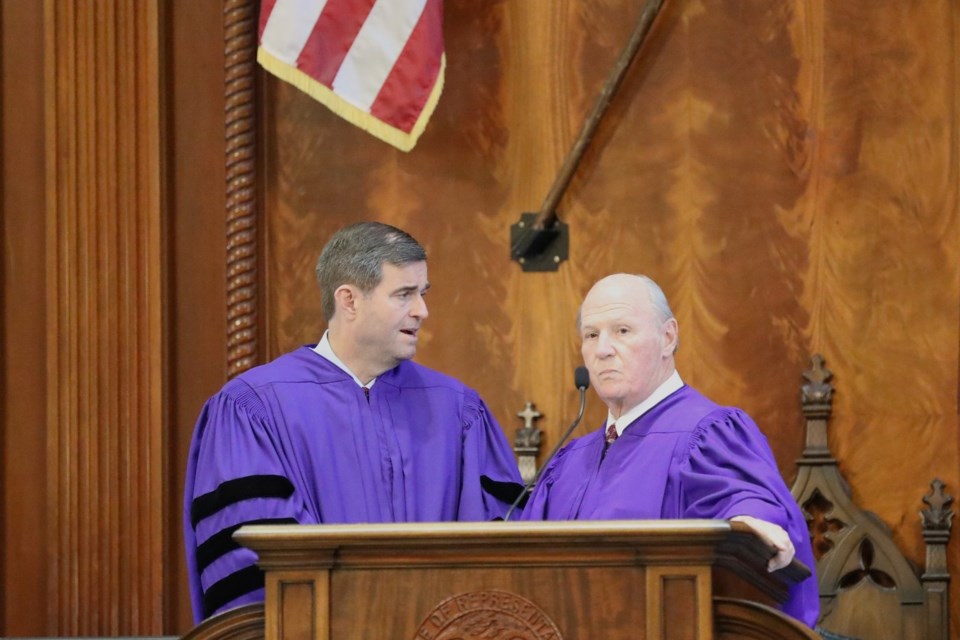COLUMBIA, S.C. (AP) — The South Carolina General Assembly wrapped up its regular 2025 session Thursday with a few accomplishments, but a number of things like the fate of the state treasurer and radical changes in the state's tax code are still up in the air.
In a flurry of action over the final days, the Republican-dominated legislature passed a bill they hope will reduce skyrocketing insurance rates for restaurants and clubs that serve liquor, and another measure that utilities said was necessary for them to meet the growing demand for power as the state's population booms.
And by the end of the year, it will likely be illegal for drivers to hold their cellphones in their hands.
Lawmakers also passed a bill allowing parents to spend public money on private schools. The General Assembly passed a similar voucher program in 2023 but it was struck down by the state Supreme Court. Republicans are confident they made just enough changes that the justices won't rule again that it violates the state constitution by directly benefiting private schools.
Republican Gov. Henry McMaster has either signed or is expected to sign all those proposals.
This is the first of the two-year session, so all pending bills will remain where they are until January when the 2026 session begins.
But since the 2024 elections created a Republican supermajority in the Senate and locked in the one in the House, issues like a hate crimes law or medical marijuana measure that have been building support fell off the radar this session.
“In the big picture, we didn't do any momentous legislation this year that's going to be remembered long after this year other than potentially the voucher bill if it is somehow found to be constitutional,” Democratic Senate Minority Leader Brad Hutto said.
Big wins
The liquor liability proposal keeps the requirement for restaurants and bars that serve alcohol to have $1 million in liability insurance. But they can reduce the amount of coverage they must carry by doing things like closing early, having scanners to confirm IDs or showing less than 40% of their sales come from alcohol.
Lawmakers discussed tackling other issues with civil lawsuits, but mostly punted that to next year.
On energy, lawmakers decided to allow private Dominion Energy and publicly-owned Santee Cooper to work together on a large power plant run on natural gas that both utilities say is needed to meet growing energy needs. The bill also requires regulators to review permits for utility projects quicker.
The compromise did not include any limits on data centers, which can use massive amounts of power, or protections some lawmakers wanted for when utilities want to take private land to build pipelines, power lines or substations.
“You’re going to regret this,” said Republican Senate Majority Leader Shane Massey, who several times invoked problems utilities created with too much operational freedom, such as losing billions of dollars on nuclear reactors that were never completed.
Wait 'til next year
The House passed a bill that would substantially alter the state's income tax system after their original plan was criticized for raising taxes for up to 60% of filers in its first year.
The new plan would leave two rates — 1.99% on the first $30,000 of taxable income and 5.39% on everything above that. The current highest rate will likely be dropped to 6% this summer. Republicans said their goal is to slowly drop the higher rate until everyone pays 1.99%. When initially put in place, about 24% of taxpayers will pay more.
The Senate didn't take up the bill.
The Senate voted to remove Republican Treasurer Curtis Loftis from office for his role in a $1.8 billion accounting error that required millions of dollars by forensic accounts to determine it didn't involve actual money, just bad entries in the state's ledgers.
Loftis remains in office because the proposal needed a two-thirds vote from the House as well, and Republican Speaker Murrell Smith said nothing will happen next year — when Loftis plans to run for reelection — because most of the party doesn't think that is an appropriate punishment.
“We need to let the voters decide if they want to keep him in office,” Smith said.
Never mind
Two perennial issues in the General Assembly — a hate crimes bill and a proposal allowing medical use of marijuana — didn't get much traction in 2025.
After passing a bill that would make South Carolina the 49th state with a hate crime laws in previous sessions, the House ignored it in 2025. The effort has failed continuously in the Senate, and Massey said he doesn't expect that to change any time soon because he sees no need for it.
Medical marijuana has passed the Senate twice in recent years but couldn't quite get through the House. This year it failed to get a hearing in either chamber.
Jeffrey Collins, The Associated Press



